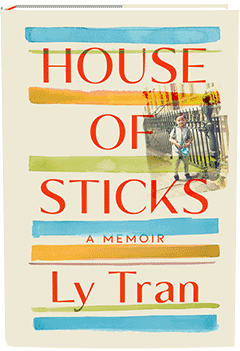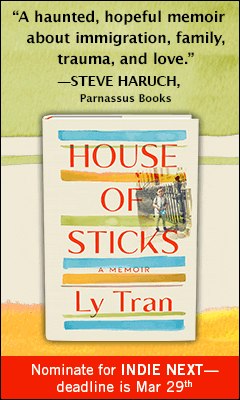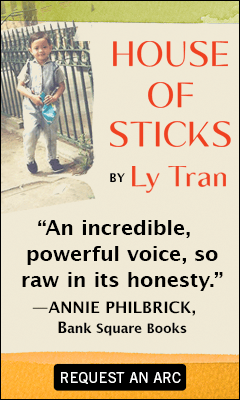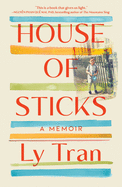House of Sticks: A Memoir
by Ly Tran
In her phenomenal debut, House of Sticks: A Memoir, Ly Tran mines both trauma and love from her coming of age as a young Vietnamese immigrant to the United States. Tracing her arrival to the U.S. as a three-year-old through her tumultuous college years, Tran probes the various educations she receives and the evolving ways in which she comes to see the world around her. Her vivid, unadorned narration yields a painful but powerful exploration of the struggle to find a sense of self within a family at the cross-section of cultures, and Tran's story is impossible to forget.
The long shadow of the Vietnam War casts a pall throughout her family's journey. As a teenager, Tran's father served as a lieutenant in the South Vietnamese Army, plotting bomb coordinates for an artillery unit--then was held as a prisoner of war for nearly a decade, narrowly avoiding execution. Even when he was freed from the "re-education" camp, the government's grip on his livelihood--and that of his growing family--continues. In 1993 he applies to a humanitarian relocation program, and he, his wife and their four children--all under 10 years old, with Ly the youngest at three--start anew in the United States.
The Trans move into a small apartment in Queens, N.Y., and immediately begin eking out their survival. Their apartment becomes a veritable sweatshop: the whole family works, sewing ties, flight attendant scarves and cummerbunds. The pay is paltry and extreme thrift a necessity despite the family's tireless efforts. Tran paints their poverty with telling details: "We diluted our dishwashing liquid with water. We diluted our detergent with water. We bought two-in-one shampoos, and separated one roll of two-ply paper towels into two rolls."
As the family works long hours, Tran watches her three older brothers' various models for assimilating, learning from them while growing increasingly aware of ways her gender impacts her parents' expectations of her. When it's time for her to begin school, the divide widens even further between the roles she plays at home and the ways she's expected to behave outside of it.
At their father's behest, all the Tran children excel academically. His own aptitude for math, enabling him to avoid the battlefield, had literally meant his survival in the war--and he is dogged in ensuring his children be educated. Tran recalls, "When Long was six and I was only four, he made us recite the multiplication tables while we cut fabrics and pleated cummerbunds on the floor of our living room. In later years he'd beat us when we didn't understand our math homework. He'd give us equations to solve before we went to bed at night and test us on them in the morning. It wasn't just a question of understanding numbers. He was trying to save our lives."
Eventually, the "sweatshop era" gives way to the nail salon era. Tran's mother begins working as a manicurist and the family ultimately purchases a nail salon. Again, Tran works long hours in the family business on top of her schoolwork. In the salon, though, she and her parents find themselves confronting more explicit racism than ever. Not only is their work undervalued, as before, but many customers are outright racist and abusive.
Central to many of the conflicts Tran faces is her diminishing ability to see and thus contend with her surroundings. Her father's perpetual distrust of any government wins out for years after it becomes clear that Tran needs glasses; he believes her diagnosis is a government conspiracy. As her vision worsens and her grades slip, she is victim to his abusive flare-ups; his PTSD rears often. Tran also becomes increasingly burdened by anxiety, and is diagnosed with major depressive disorder.
Though mentors and helpers abound, and Tran's test scores land her at an elite high school, the stress becomes crippling. While some school programs offer support, more often the systems designed to protect struggling students wind up imposing further burdens upon Tran. Well-meaning teachers and counselors report her family to the Administration for Children's Services, who send caseworkers to investigate whether Tran's parents have been negligent. Tran manages to get the case closed but is required to see a psychiatrist for her remaining time in high school. Come college, she earns a full scholarship but finds herself spiraling ever deeper into her depression. Eventually, Tran cracks.
But hers is not a story only of pain. Tran is not passive. Akin to the sprawling Buddhist altar Tran's parents faithfully construct in their apartment, House of Sticks is itself like an altar--a tribute, built piece by painful piece, cloaked in love. Early in her memoir, Tran reflects on the bed her father constructs for her and her siblings, jury-rigging a third surface to a bunk bed with a mishmash of found materials and duct tape. It sounds rickety at best. And yet, she writes, "Despite the way it looked and felt, it was sturdy." So is the family's love. At its core, House of Sticks is a tribute to her parents, an exercise in mercy, powerfully wrought. Tran's courageous telling offers a vision of the myriad fragile and beautiful ways one can build a sense of home and belonging with love as a foundation--one that is, despite the way it might look or feel at times, sturdy. --Katie Weed








